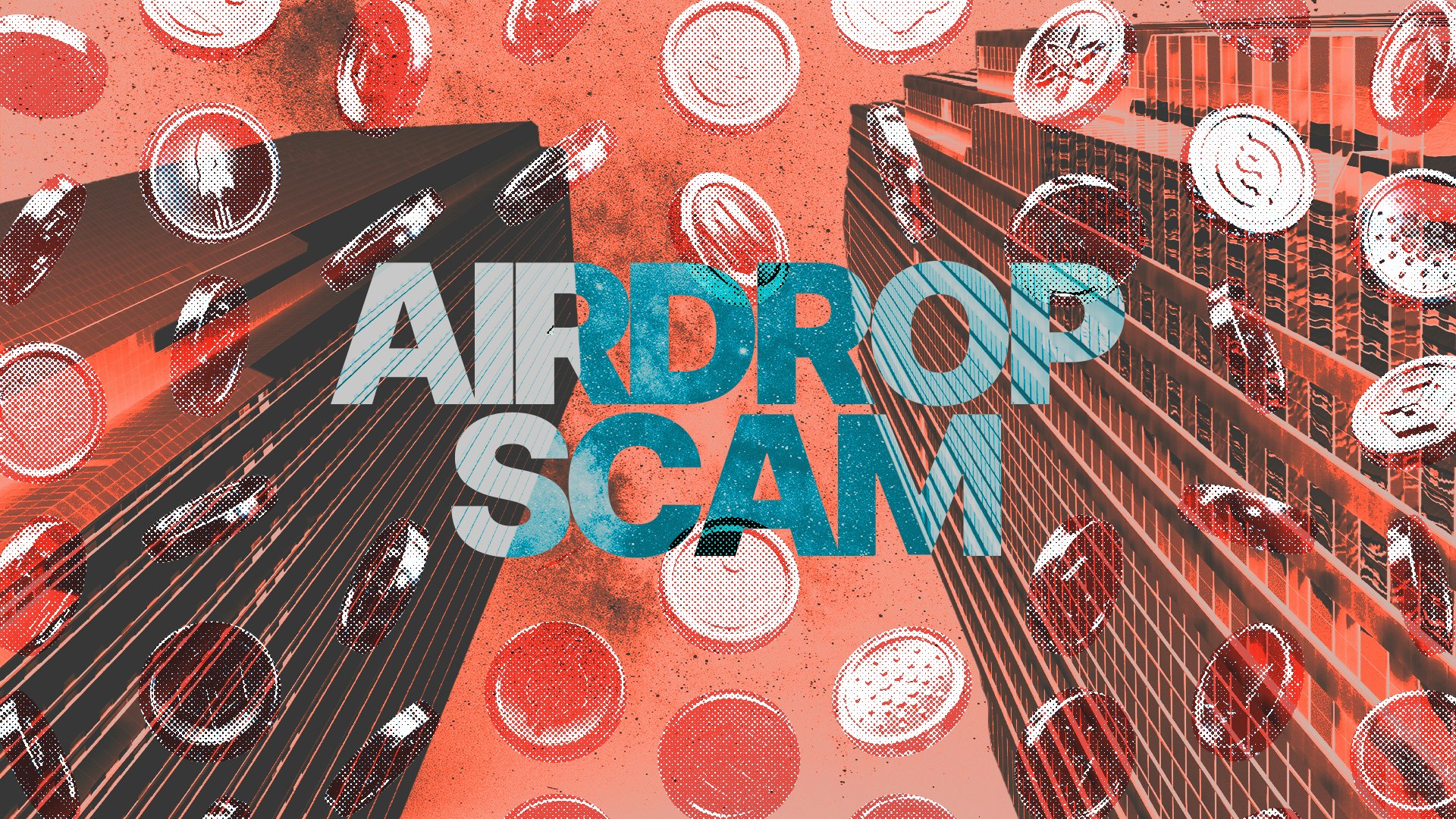Coming soon to the USA! While our services may not be available yet, sign up now to stay in the loop as we bring our innovative crypto solutions to America.
Common Airdrop Scams and How to Avoid Them
Fake airdrops can trick users into handing over their information. Here's how to avoid airdrop scams.
In this article...
- Unfortunately there have been airdrop scams in the past
- Legitimate airdrops will never ask you to give up your private keys or your recovery phrase
- If you receive an unsolicited airdrop offer, be very cautious.

Airdrops are a popular way for blockchain projects to distribute free tokens to their communities. However, scammers have also taken advantage of this trend, using fake airdrops to trick unsuspecting users into giving up their private keys or other sensitive information.
We are here to help you understand how airdrop scams work and provide actionable tips to avoid falling victim to them.
What are airdrop scams
Airdrop typically involve scammers creating fake websites or social media accounts that mimic legitimate blockchain projects. They then announce a fake airdrop, promising free tokens to anyone who completes certain tasks, such as connecting their wallet, following their social media accounts, or sharing the airdrop with their friends.
However, these tasks are often designed to trick users into giving up their private keys or other sensitive information, which the scammers can then use to steal their cryptocurrency.
Also, connecting your wallet to a fraudulent website or smart contract could allow the scammers to drain your wallet of all its funds.
Examples of past airdrop scams
Unfortunately there have been airdrop scams in the past.
The Uniswap scam
In 2020, scammers created a fake Uniswap website and announced a fake airdrop of 400 UNI tokens to anyone who connected their wallet. Once users connected their wallet, the scammers were able to steal their cryptocurrency.
The Ethereum Name Service (ENS) scam
In 2022, scammers created a fake ENS website and announced a fake airdrop of ENS tokens to anyone who registered a .eth domain name. However, the registration process required users to give up their private keys, which the scammers then used to steal their cryptocurrency.
The "Pig Butchering" scam
This elaborate scam involves scammers building trust with victims over time, often through social media or dating apps.
They then introduce the victim to a fake cryptocurrency investment opportunity or airdrop, convincing them to invest large sums of money. Once the victim has invested, the scammers disappear with their money.
How to avoid airdrop scams
Do your research
Before participating in any , thoroughly research the project and the team behind it. Check their official website, social media accounts, and whitepaper. Look for any red flags, such as a lack of transparency or a history of scams.
Never give up your private keys
Legitimate airdrops will never ask you to give up your private keys, your recovery phrase, or other sensitive information. If an airdrop asks for this information, it is a scam.
Be wary of unsolicited airdrops
If you receive an unsolicited airdrop offer, be very cautious. Scammers often use unsolicited airdrops to target unsuspecting users.
Use a disposable wallet
If an airdrop requires you to connect a wallet, consider using a disposable “burner” wallet so that the cryptocurrency in your main wallet is not put at risk.
Double-check URLs and social media accounts
Scammers often create fake websites and social media accounts that look very similar to legitimate ones. Always double-check the URL and social media handle before connecting your wallet or providing any personal information.
Trust your gut
If something feels off about an airdrop, trust your gut and walk away. It's better to be safe than sorry.
Conclusion: Avoiding airdrop scams
Airdrops can be a great way to earn free cryptocurrency, but it's important to be aware of the risks involved. By following these tips, you can protect yourself from airdrop scams and enjoy the benefits of participating in legitimate airdrops. Do your research, never give up your private keys, and trust your gut.

Frequently asked questions
What are airdrop scams, and why are they so prevalent?
Airdrop scams exploit the excitement surrounding free airdrops, tricking users into divulging sensitive information or interacting with malicious smart contracts. Scammers leverage the allure of free tokens to gain unauthorised access to your wallet or steal your funds.
How do airdrop scams typically work?
Common tactics include:
Phishing scams: You might receive an email or message claiming you've won an NFT airdrop, prompting you to visit the site and connect your wallet.
Malicious token approval: Scammers might trick you into granting excessive token approval to a smart contract, enabling them to drain your funds.
Fake airdropped token scams: Scammers might create a counterfeit token with a similar name to a legitimate project and distribute it in an airdrop, hoping to deceive unsuspecting users.
Fraudulent websites, Medium articles, and blog posts can achieve high rankings in Google search results, sometimes even appearing as the top result.
How can I protect myself from airdrop scams?
Never share your seed phrase or recovery phrase with anyone. These phrases are the master keys to your wallet.
Be wary of unsolicited airdrops. Legitimate projects typically announce airdrops through official channels.
Verify the authenticity of airdrops. Cross-check information with official project websites or social media channels.
Use blockchain explorers to verify token contracts and transactions. This helps ensure you're interacting with legitimate tokens and contracts.
Be cautious with token approvals. Only grant the necessary permissions to smart contracts.
Remember, there's no such thing as a free lunch. If an airdrop seems too good to be true, it probably is.
What should I do if I think I've been scammed?
Revoke any suspicious token approvals immediately. If you've connected your wallet to a suspicious website or decentralised application (dApp), you may have unknowingly granted it permission to access your tokens. Revoke these approvals as soon as possible to prevent further loss of funds.
Transfer any remaining funds to a new wallet. It is crucial to transfer any remaining cryptocurrency to a new wallet that is not associated with the compromised recovery phrase. Assume that all wallets generated using the same recovery phrase are compromised.
This means that simply adding a new wallet to your existing MetaMask account is not sufficient. You must create an entirely new wallet with a new recovery phrase. This can be achieved by:
-Downloading MetaMask to a browser that did not previously have it installed.
-Uninstalling your existing MetaMask and installing a new version.
-Using a completely different wallet provider.
Report the scam to the relevant authorities and blockchain communities.
How can I stay informed about airdrop scams and other security threats?
-Follow reputable sources of information about blockchain security.
-Stay updated on the latest scams and security best practices.
-Participate in online communities and forums where you can discuss security issues and get advice from other users.
By being vigilant and informed, you can significantly reduce your risk of falling victim to airdrop scams and other security threats in the blockchain space.
Always remember, protecting your wallet addresses and private keys is paramount to safeguarding your digital assets.


Suggested Articles
What is Bitcoin (BTC)? What is "Digital Gold" Used For?
What is Bitcoin? It is a digital currency that can be traded, exchanged, and used as a form of payment independent of central banks and governments.What is Ethereum? What is ETH Used For?
Ethereum is a decentralised blockchain-based open-source software platform that allows for the development of decentralised applications (dApps).What Is Crypto? How do Cryptocurrencies Work?
Crypto has become incredibly popular. But how does this digital currency work? And are there cryptos other than Bitcoin?Browse by topic
Copyright © 2023 CoinJar, Inc. All rights reserved. The products and features displayed on this website are representative of our Australian and UK services and certain features may not be offered to customers residing in the United States, depending on applicable state and federal regulations.
Google Pay is a trademark of Google LLC. Apple Pay and Apple Watch are trademarks of Apple Inc.
This site is protected by reCAPTCHA and the and apply.